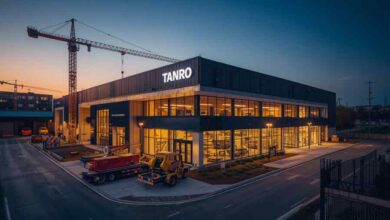Anthony Kleanthous: The Visionary Businessman Behind Barnet’s Rise and Transformation

Anthony Kleanthous is a name widely recognised in British football, business, and property development. Known primarily as the long-standing chairman of Barnet Football Club, he has also spent decades developing ventures in telecommunications, leisure, health technology, and large-scale infrastructure projects. His journey is a unique blend of entrepreneurial grit, community-driven development, and long-term strategic thinking.
Early Life and Background
Anthony Andrew Kleanthous was born in January 1966 in Finsbury Park, London, to a British-Cypriot family. He grew up in a busy, multicultural area of north London, surrounded by the working-class energy that shaped much of the city’s identity in the 1970s and 1980s. From an early age he demonstrated curiosity, practical skills, and an instinct for business opportunities.
He attended college in Waltham Forest, where he studied motor vehicle engineering. Even as a teenager he possessed a strong inclination towards technical subjects and hands-on problem-solving. This engineering foundation later played a major role in shaping his analytical style as a businessman.
While many people begin their careers slowly, Kleanthous entered adulthood with determination. He refused the traditional path of salaried employment and instead chose entrepreneurship. This attitude drove him to explore different markets, learn how systems work, and understand the relationship between technology and consumer behaviour.
Early Business Career: From Engineering to Telecommunications
Kleanthous did not remain long in the motor trade. In the late 1980s and early 1990s, mobile telecommunications was a rapidly emerging industry, and he was among the early entrepreneurs who recognised its potential. He founded a company known as NAG Telecom and quickly became involved in mobile phone distribution.
Mobile technology was new, expensive, and rapidly expanding. Many entrepreneurs overlooked the sector, but he saw an opportunity to grow by understanding customer needs and anticipating long-term change. His early telecom ventures established him as a capable operator with a sharp understanding of sales, distribution networks, and high-growth markets.
This experience also taught him how to build relationships with suppliers, manage large teams, and scale operations — skills that he would later transfer to the world of sports, leisure, and medical services.
Acquisition of Barnet F.C.
In 1994, at just 28 years old, Anthony Kleanthous purchased Barnet Football Club. At that time, he became one of the youngest football chairmen in the English Football League. His decision to invest in a club was not just financial; it was driven by passion, ambition, and a desire to build something meaningful for the community.
Barnet was a traditional local club with an enthusiastic fan base but limited resources. The facilities were outdated, and the club faced operational and financial challenges. Kleanthous saw the potential for transformation. Over the next decades, he committed not only funds but vision, leadership, and strategic direction.
Modernising the Club and Introducing Long-Term Stability
One of the defining characteristics of his leadership has been his emphasis on infrastructure. Instead of short-term fixes, he pursued projects that would strengthen Barnet for decades to come.
He worked to stabilise the club financially, modernise its operations, and introduce more professional structures. Football clubs often struggle when their revenue depends solely on matchdays, but he believed strongly in diversified income streams. This mindset later inspired the creation of one of the most innovative multi-purpose sports complexes in modern British football.
The Hive: A Landmark Project
Perhaps the most significant achievement of Anthony Kleanthous’s career is the development of The Hive in Edgware. What began as a training facility gradually evolved into a major sports, leisure, and medical hub.
A Vision for Growth
Kleanthous recognised early that strong infrastructure is the backbone of any successful club. The Hive was designed not only as a stadium but as a multifunctional ecosystem. It includes:
- A modern football stadium
- Multiple high-quality training pitches
- A gym and fitness centre
- Indoor halls
- Community sports facilities
- A state-of-the-art medical imaging and diagnostic centre
The project required enormous investment, long planning phases, and persistent negotiation. It stands today as an example of how a football club chairman can think beyond the pitch and create wider community impact.
Community Benefits
The Hive is not exclusive to Barnet players. It serves local youth, children, schools, amateur clubs, and community groups. This reflects Kleanthous’s belief that football institutions have a duty to give back and support local development.
Local Economic Impact
The Hive created jobs, increased footfall in the area, promoted sporting culture, and improved the overall environment. It is now widely recognised as one of the most modern football-related facilities in London.
Innovations in Sports Medicine
Another remarkable part of Kleanthous’s portfolio is his investment in medical imaging and diagnostic services. He introduced advanced scanning units and medical technology into The Hive, turning it into a unique combination of sports facility and medical centre.
This venture demonstrates his ability to blend industries — sports, health, and technology — into a single blueprint. As a result, The Hive became not just a training ground but an important hub in the sports medicine sector.
Contribution to Women’s Football
Anthony Kleanthous is also known for his support of women’s football. Under his leadership, the club created a professional women’s team, contributing significantly to the growth of the sport. This demonstrates his forward-thinking mindset, recognising the importance and future potential of women’s football long before it reached mainstream popularity.
Leadership Style and Business Philosophy
Kleanthous has always been a private and focused businessman. He prefers results over publicity and long-term planning over short-term gains. Several themes define his leadership:
Visionary Thinking
He approaches projects with a long horizon. The Hive, for example, took years of development and millions in investment, yet he continued pursuing it with determination.
Diversification
His ventures span telecommunications, football, property, leisure, medical technology, and hospitality. This diversification mirrors the strategy of building multiple revenue streams to reduce risk.
Community-First Outlook
Whether through sports facilities or local engagement, he maintains a strong community focus. His work at Barnet F.C. shows that a football club can be both a business and a community institution.
Resilience
Over thirty years as chairman, he has experienced promotions, relegations, disputes, financial challenges, and infrastructure obstacles. His ability to remain committed is a hallmark of his character.
Business Expansion Beyond Football
While many people associate him only with Barnet F.C., Anthony Kleanthous has a much larger business presence. Over the decades, he has grown a group of companies across Europe, including:
- Property investment
- Leisure facilities
- Medical diagnostic services
- Technology distribution
- Sports infrastructure
This network reportedly spans dozens of companies and has generated a significant economic footprint. His business portfolio illustrates how one entrepreneur can successfully combine multiple industries under one strategic vision.
Influence on Modern Football Club Ownership
Kleanthous is considered an influential figure in the evolution of English club ownership models. He introduced several modern practices including:
- Integrated sports complexes
- Multi-use stadium designs
- Advanced sports medicine within club infrastructure
- Professional business management in lower-league football
His work shows that ambition is not limited to Premier League giants — smaller clubs can innovate and build world-class facilities when guided by strong leadership.
Personal Traits and Public Image
Although influential, he is a generally private person who avoids unnecessary media attention. Supporters often describe him as determined, ambitious, and highly strategic. His reputation is marked by both strong loyalty to the club and a willingness to make bold decisions when needed.
The Legacy of Anthony Kleanthous
After more than three decades at Barnet F.C., his impact is undeniable. He transformed a modest club into one with some of the best facilities in the country at its level. The Hive stands as a physical representation of his vision, commitment, and long-term investment.
He also contributed significantly to the growth of local sport, women’s football, and medical technology. His entrepreneurial journey continues to influence business leaders, sports executives, and aspiring owners who study his model.
Conclusion
Anthony Kleanthous is far more than a football chairman — he is a visionary entrepreneur whose work spans several industries. His leadership transformed Barnet F.C., revolutionised local sports infrastructure, advanced community development, and introduced innovative medical technologies. His long-term mindset, resilience, and diversified business approach provide an inspiring blueprint for modern entrepreneurs. As Barnet continues to grow, his legacy remains firmly rooted in the foundations he built and the future he envisioned.



